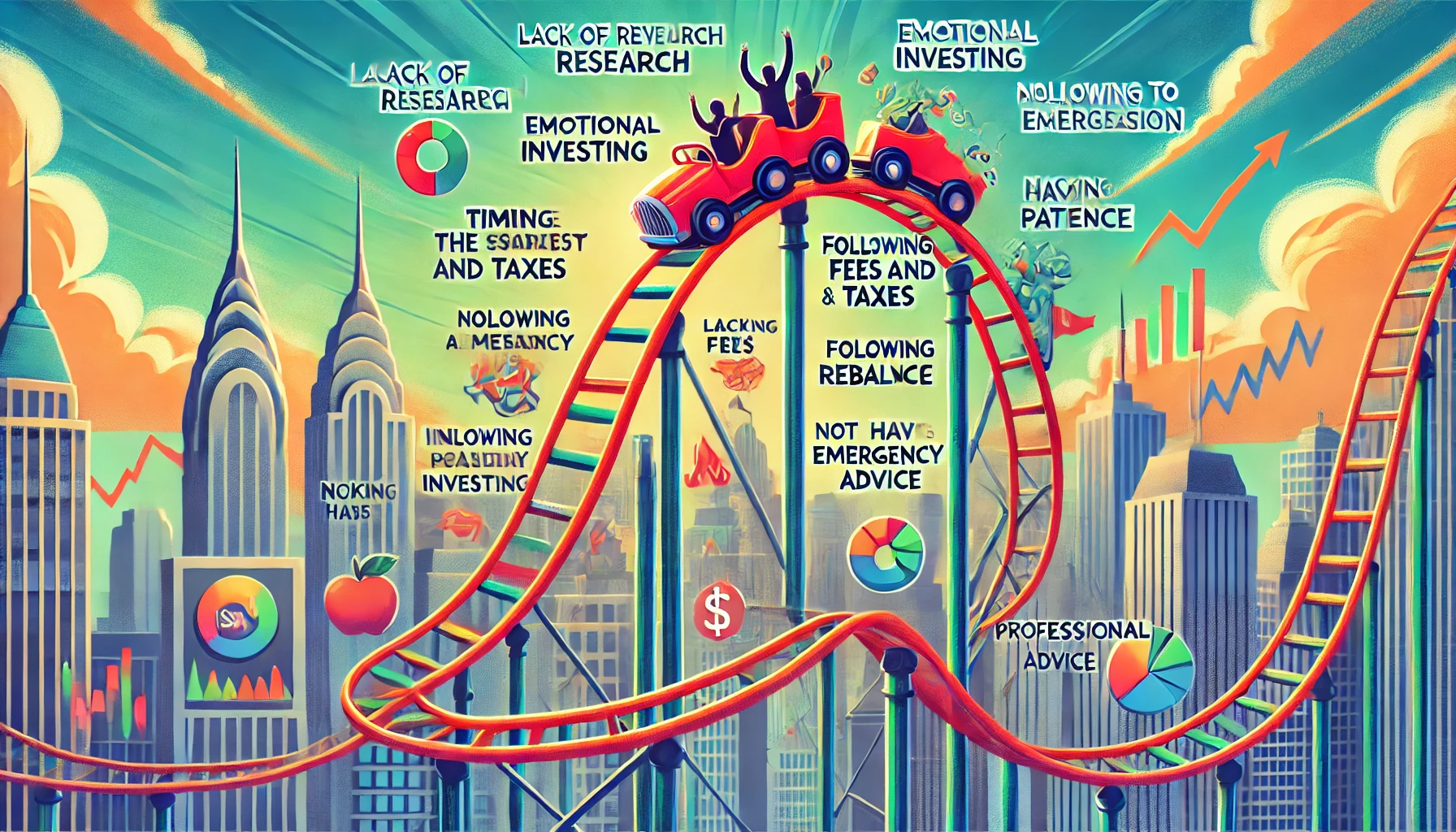
Investing can feel like a roller coaster, especially if you’re new to the game. Making mistakes is part of the learning process, but some common pitfalls can be avoided with a little know-how. In this guide, we’ll break down some frequent investing blunders and give you practical tips on how to steer clear of them. Let’s dive in!
Lack of Research
One of the biggest mistakes new investors make is diving in without doing proper research. It’s like going on a road trip without a map.
How to Avoid:
- Read Up: Take the time to read books, articles, and reliable online resources about investing.
- Understand What You’re Investing In: Don’t just buy stocks or funds because someone else is. Know the business and the market.
- Stay Informed: Keep up with the news and trends in the financial world.
Emotional Investing
Emotions and investing don’t mix well. Buying high out of excitement and selling low out of fear can wreck your portfolio.
How to Avoid:
- Have a Plan: Set investment goals and stick to them.
- Stay Calm: Don’t make impulsive decisions based on market highs and lows.
- Think Long-Term: Focus on your long-term objectives instead of short-term fluctuations.
Over-diversification
While diversifying is good, spreading yourself too thin across many investments can dilute your returns and make management a nightmare.
How to Avoid:
- Find a Balance: Diversify enough to mitigate risk but not so much that you can’t keep track of your investments.
- Know Your Assets: Choose investments that complement each other and fit your risk profile.
Ignoring Fees and Taxes
Many investors overlook the impact of fees and taxes, which can eat into your returns over time.
How to Avoid:
- Check Fees: Always be aware of management fees, transaction fees, and other charges.
- Tax Efficiency: Look into tax-efficient investments and strategies to minimize your tax bill.
Timing the Market
Trying to time the market is a risky endeavor. Even seasoned investors often fail at predicting the perfect time to buy or sell.
How to Avoid:
- Dollar-Cost Averaging: Invest a fixed amount regularly regardless of market conditions.
- Stay Invested: Maintain your investments even during market downturns to ride out volatility.
- Avoid Speculation: Stick to your investment plan rather than trying to chase quick profits.
Following the Crowd
Just because everyone else is investing in a hot stock or trendy sector doesn’t mean you should too. Herd mentality can lead to poor investment choices.
How to Avoid:
- Do Your Homework: Make decisions based on solid research and personal financial goals.
- Be Skeptical: Question the hype and consider the risks before following the crowd.
Lack of Patience
Investing is a marathon, not a sprint. Expecting quick returns can lead to disappointment and rash decisions.
How to Avoid:
- Set Realistic Expectations: Understand that good investments take time to grow.
- Stay Disciplined: Stick to your plan and be patient with your investments.
- Review Regularly: Periodically review your portfolio but avoid constant tinkering.
Neglecting to Rebalance
Over time, your portfolio can drift from its original allocation, increasing risk.
How to Avoid:
- Regular Check-ups: Review your portfolio at least once a year.
- Rebalance as Needed: Adjust your investments to maintain your desired allocation.
- Stay Consistent: Stick to your rebalancing strategy to keep your portfolio on track.
Not Having an Emergency Fund
Investing without a safety net can force you to sell investments at a loss during emergencies.
How to Avoid:
- Build an Emergency Fund: Aim to save at least 3-6 months’ worth of expenses in a liquid, easily accessible account.
- Avoid Dipping In: Use this fund only for genuine emergencies to keep your investments intact.
Ignoring Professional Advice
Thinking you can handle everything on your own can lead to mistakes, especially if you’re not well-versed in investing.
How to Avoid:
- Consult a Financial Advisor: Get professional guidance tailored to your financial situation.
- Learn Continuously: Even if you seek advice, continue educating yourself about investing.
Role of Emotions in Investing you need to know
FAQs
Q: What is the biggest mistake to avoid when investing?
A: Not doing enough research is a major mistake. Understand what you’re investing in before putting your money down.
Q: How often should I review my investment portfolio?
A: Aim to review your portfolio at least once a year, or whenever there’s a significant change in your financial situation.
Q: Is it bad to invest based on emotions?
A: Yes, emotional investing can lead to poor decisions like buying high and selling low. It’s better to stick to a plan.
Q: How can I avoid high fees when investing?
A: Choose low-cost investment options and be mindful of management fees and other charges.
It’s here Investor Mindset at time of inflation
Wrapping Up
Avoiding common investing mistakes can save you a lot of headaches and help you build a stronger financial future. By doing your research, staying calm, and having a solid plan, you can navigate the investing world with more confidence. Remember, investing is a journey—stay patient and informed, and you’ll be on the right track.

